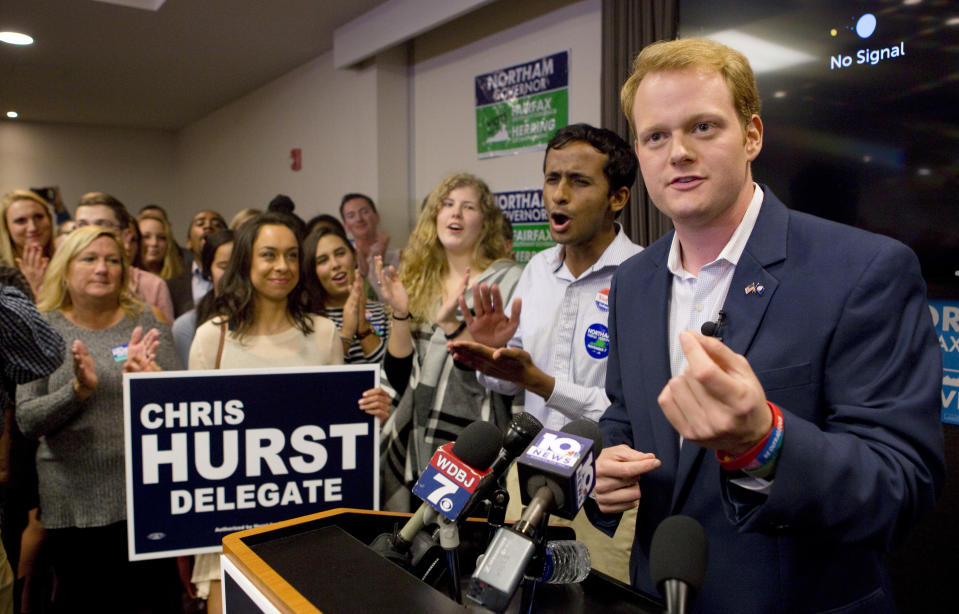Democrats make huge gains in Virginia House
WASHINGTON — Democrats romped in Virginia Tuesday, winning seat after seat in the state House of Delegates, where Republicans held a seemingly insurmountable 32-seat advantage as voters went to polls. Democrats picked up 16 seats and had a 50-49 edge in called races, with one contest still too close to call, putting them on the cusp of an even split or majority in the 100-seat chamber.
The Democrats retained control of the governor’s mansion by a surprisingly healthy margin. The upper house, which was not on the ballot this year, has a narrow Republican margin.
Call it the revenge of Obama’s America. Candidates straight from blue-state central casting defeated longtime Republicans on the strength of high turnout, driven by campaigns that focused on local issues and took advantage of fierce Democratic anti-Trump sentiment to rack up impressive fundraising numbers — and get-out-the-vote help from outside groups.
Virginia voters elected the first openly transgender state legislator in Virginia, 33-year-old Democrat Danica Roem, who ran a campaign focused on transportation issues. She defeated 26-year incumbent and social conservative Bob Marshall, 73, author of a proposed “bathroom bill” prohibiting trans people from using the bathroom of their choice.
They ousted Republican House Majority Whip Jackson Miller, replacing him with Lee Carter, a former Marine and member of the Democratic Socialists who led a rendition of “Solidarity Forever,” the union anthem, at his victory party. Carter made his anti-Trump views plain in February when he marched on the White House chanting, “Hey hey, ho ho, Donald Trump has got to go.”
They elected Irish-Lebanese-Latina candidate Hala Ayala, former president of her local chapter of NOW. She defeated Republican incumbent Rich Anderson in Prince William, who had sent out controversial mailers accusing her of wanting to give rights to “thugs, violent criminals, gang members and child predators.” Ayala and Democrat Elizabeth Guzman, who also defeated a GOP incumbent, will be the first two Latinas in the Virginia House of Delegates.
Democrat Chris Hurst, whose reporter girlfriend Alison Parker was slain on live television in Virginia and ran on a gun control platform, unseated incumbent Republican Joseph Yost.

Before the election, organizers active in the statehouse elections had predicted pickups of up to eight seats, nine if they were being optimistic.
It wasn’t a redistricting year, after all, and the state’s heavily gerrymandered districts are all still on the maps. But the blue wave Tuesday night that saw Ralph Northam declared the victor in the governor’s race shortly after 8 p.m. and Justin Fairfax win the lieutenant governor spot, becoming only the second African-American elected statewide in Virginia since the Civil War, lifted candidates in the House of Delegates contests far beyond what organizers expected.
“Flipping 14 seats from red to blue in VA is the biggest Democratic pick-up since 1899,” wrote Jessica Post, executive director of the Democratic Legislative Campaign Committee, in a tweet.
The one thing organizers did know: You can’t win if you don’t run, and you can’t catch a wave if you don’t have candidates. In 2015, only 29 of the state’s House of Delegates elections were head-to-head Democrat vs. Republican contests; most of the races were not contested.
That changed this year, when 88 of the races featured head-to-head contests.
Read more from Yahoo News:



